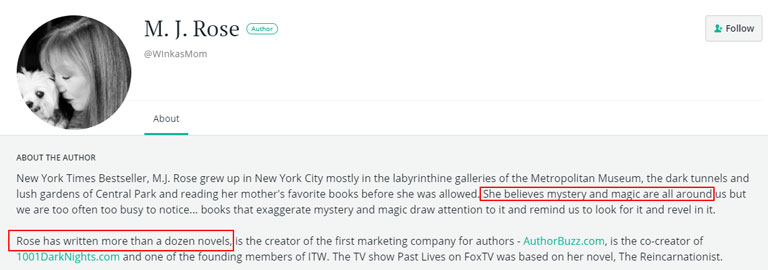The aim of this guide is to teach you how to do guest posting the ethical way; so your content can help add value to blog readers without violating Google’s and other search engines’ policies.
We are in an era where content is still king and the main focus is to give more value to human readers. Gone are the days of stuffing keywords and creating content just to get noticed in the search engines.
Although a lot has been said about guest posting (also referred to as guest blogging) in the past few years, today and perhaps in the future, it will still thrive and provide bloggers and readers a whole new level of valuable content.
In the past, Google gave guest blogging a ‘go signal’ but it backfired since SEO black hatters have found an opportunity to spam other websites with the hopes of building large amounts of links. Fast forward to 2014, Google has made it clear since last year that guest blogging for the purpose of SEO is ‘done’.
Google’s take on guest blogging is clear:
- Publish only high-quality and useful content by reputable authors which answers the questions of people searching online
- Write content that is optimised for discovery and can be easily indexed by search robots
- Links should only go to reputable sites
You need to know this guide because you need to fulfill three crucial things whenever you submit a guest post:
- First is to let a targeted audience know that you and your e-store exist (so you’ll get new visitors that may become customers in the long run)
- Second is to provide valuable content to the host blog and its readers (because quality content is and will always be king in the eyes of people and search engines)
- Third is to “look good” and comply with the search engines so you and the host blog won’t get penalized (so you can continue your good work of providing valuable content to other blogs and to get visitors to your own blog/e-store)
Like any other content marketing technique, guest posts must serve the readers first. SEO should only be second priority.
One of the many advices you’ll get from other bloggers is to use a nofollow link on guest posts. A nofollow link doesn’t count as a point in a webpage’s favor, doesn’t boost PageRank, nor helps websites get top placement in the search engine results.
However, if the link itself (to the guest poster’s website) is irrelevant and has nothing to do with the content and/or the blog publishing it, that’s a potential problem.
Below is a list of guest posting best practices that can help you submit ethical posts that are beneficial to both you and the host blog.
Step 1: Write For The Right Audience And In The Right Voice
Focusing on this very first practice will help you in many ways. You need a host blog that’s relevant to your content in order to get the readers to notice.
Make sure to review the posts on the host blog to get a feel of what topics are engaging and relevant to the readers. You can coordinate with the host blogger regarding the needs, questions, and reactions of their readers, so you can craft an ideal post for them.
Even with only one compelling post on a host blog, you may be able to engage readers and convert them into visitors to your own blog. Talk the way they talk, as they say, in order to show them that your messages are intended for them and not just for a backlink to your blog.
Your guest post is also helpful to search engines when they look for linking relationships based on appropriate niche groups. To put it simply, your own blog should fit the niche blog you’re posting your content on because search engines notice this and will boost the link/s to your own blog.
Step 2: Write Quality Posts
As mentioned earlier, content is still king in the 21st century and it should be your top priority when writing a guest post. It should be unique and never-been and never-will-be submitted to other blogs or your own blog.
You can refer to our guides on blog writing basics and learning from the best teachers if you need help with your writing.
Before you submit your post, make sure to re-check your draft a couple of times to catch any typo or grammatical error. Your content should be clear and it should fit the host blog and its audience.
Some tips to boost your guest blog post:
- Use visuals – your own product photos, video demonstrations or slide presentations are great accompaniments for a quality guest post
- Avoid stock photos unless there’s no other choice – if you are writing about a specific topic that doesn’t involve any of your products, make sure to look for relevant stock photos if you have no other choice
- Provide details – a detailed and well-written guest post shouts credibility and authority over the niche
- Use conversational tone – you are not talking to grad students in Harvard, so be conversational and casual when it comes to your writing style
Step 3: Check Your Backlinks And Minimise As Much As Possible
As mentioned, a nofollow link is more acceptable in the eyes of Google. But it has to be relevant to the host blog and its readers in order for content to entirely fit and provide value.
If you are not sure of your backlinks, you can talk about this with the host blogger or remove your backlinks entirely if they don’t fit the message. An alternative would be a by-line or short author bio mentioning the name of your store.
If you want to be published on a significant host blog, make sure to adhere to their minimum number of links. Having two backlinks to your e-store is enough and it can also be a relief to a cautious host blogger.
Step 4: Focus On Social Sharing
Many host blogs allow their guest posters to include their Twitter, +Google, Facebook, and other social network links on their by-lines. This is a simple way of getting social connections and potential visitors to your e-store.

Step 5: Look For Relevant Niche-Specific Opportunities
Somehow, there are blogs that don’t welcome guest posters. They usually want exclusivity or are afraid of being punished by Google that they ban guest blogging altogether.
Finding a relevant niche blog that may be able to host your guest posts is one way to help build your brand and reputation in your industry. This may come as a challenge for some e-store bloggers because there are niches that are very specific, but they are out there just waiting to be discovered.
Step 6: Create An Interesting And Honest Author Bio
Being clear of who you are and what you do is important and should be clear in your author bio. This is also the section of your guest blog post that many host blogs allow for backlinks and it is the only appropriate place to plug your eCommerce store.
Below are some examples:



Step 7: Use Varying Keywords And Links

When guest posting to other blogs, make sure that you don’t often use the same keywords and links to your e-store’s pages.
Always have a variety of ideas that will enable you to use different keyword targets and links to your store. This also helps boost your store’s SEO on various pages.
Step 8: Offer Something To Readers
You can coordinate with the host blogger to help you setup a discount link or coupon for their readers. You can add the link to the coupon code onto your author by-line or at the end of your post.
Step 9: Make Sure To Answer Questions And Comments
Be available for Q&A especially in the first few days after the host blogger publish your post. It may take a while, so make sure you get notification if there are comments posted by readers.
This is also a way for you to engage and be more helpful to the host blog’s readers. It also helps build authority over the subject matter of your guest post.
Step 10: Make Sure You Understand The Host Blog’s Posting Guidelines
Each host blog has its own set of guidelines for guest post submissions. Before you even write anything, it is best to check the guidelines and contact the blog owner if you need to clarify anything.
Step 11: Avoid Guest Posting Mistakes
1. Not having a strategy
If you’re planning to use guest posting as a way to market your e-store, it is important that you have a strategy in place. Without one is a huge mistake.
If you’re trying to push a specific product or a keyword, it is best to first identify blogs within your industry. Finding one that has good rank for a specific topic or keyword is ideal because of its position in the search engines and number of targeted readers.
2. Targeting irrelevant sites
This is a huge mistake that’s waiting to happen if you do not have a strategy to start with. Not identifying your target host blog within the same industry can be very costly – because it can ruin your credibility and chance of boosting your own e-store in the search engines.
3. No record-keeping
An accurate record of your guest blogging efforts using a simple excel table will help you keep track of your posts’ progress and status. This keeps you from sending duplicate pitches to the same host blogger and to manage communications.
4. Not addressing the blog owner properly
Formality aside, it may look like a good idea to address the ‘blog editor’ or ‘blog manager’ when sending out your pitch for a guest post. But yours is not a journalistic article that needs to be pitched this way.
If you fail to address the host blog owner by his/her name, then it can be a huge turn-off at the onset. Getting to know who owns a host blog is the first step to establish good communication and it means that you’ve done your part in reaching out to the right person to contact.
5. Having spelling/grammatical errors in guest post pitch
To prove that you are a reliable guest poster starts with an initial pitch. If your pitch has numerous grammar and/or spelling mistakes, you lose your chances of being published on someone’s blog.
Ensure that you craft a good pitch by sounding friendly and casual, but also ensuring that it is flawless and free of errors.
6. Not including a blog post idea
A vague pitch to guest post isn’t helpful. If you will not include the topic or post idea on your pitch, you’re leaving the host blogger hanging and wondering what it is you’re offering.
Tell it upfront by providing a working title and some of the points you’ll cover on the post. It can be in the form of a short outline just to provide insight if the post will be a good fit.
7. Suggesting an ‘already covered’ topic
Do a Google site search to help you pitch a unique topic that will provide value to readers.
- Use this syntax in Google: site: www.blogurl.com “ search terms or keyword/phrase here “
Do a site search if you want to check for posts already published under the same topic or keywords.
8. Not following the guest posting guidelines
Many guest posts get denied simply because they were written without following the guidelines. If you plan to guest post to a couple of host blogs, make sure that you review and adhere to their unique guidelines.
These guidelines are unique to every host blog, so it is best to take your time in learning their do’s and don’ts especially when it comes to content.
9. Pushing too far for a guest post
There’s nothing more annoying to a host blogger than getting too many emails from a single guest blogger. If you want to publish your post on a specific host blog, start with a quality pitch.
If your pitch has been denied, it’s best to just move on to the next host blog. There’s no reason to stick around and be pushy, but do try to find out why your pitch was rejected so you can correct it.
10. Having too many links on your guest post
Having a maximum four links on a guest post is the ideal. But you can limit the links to two just for caution – one within the body of your content and one in your author bio or by-line.
This is a good way of showing to the host blogger that you mind their guidelines and you’re not just after getting backlinks.
11. Not providing proof that you can write
Some host bloggers don’t need proof of your writing, but others may require you to provide one. If you have been writing on your own blog or you have other online publications, it is best to include them on your introductory email.
Following these best practices and minding the common mistakes can help you get started with guest blogging. The key is to focus on human readers by providing quality content that’s relevant to both host blog and your blog or e-store.
Learn From Others
These are just a few good examples of guest posts on various sites. Generally, the rules and best practices apply to almost all guest bloggers of varying industries.
Take a look at what these guest bloggers have done in making their posts more valuable to the host blogger’s audience. See how engaged they are via social shares, likes, and comments.
An engaging guest post will always generate discussion among readers and it is a way for you to engage as well. Answering questions and thanking commenters for feedback are top two ways to do so.
Other not-so-popular sites that welcome relevant posts from guest bloggers:
- A Few Tips In Buying Bridal Jewellery (a wedding-related blog that welcomes guest bloggers to publish relevant articles on their site; allows up to 2 links)
We’ve also added a few sample guidelines for you to check out:
- Guest Posts Guidelines
- Write A Guest Post For I Will Teach You To Be Rich
- Write For Digital Photography School
Final Checklist
The opportunity to reach out and gain new readers is the ultimate goal of guest posting. Doing it the right way even before you send your pitch to the host blogger will enable you to do it ethically and successfully. It may take some time and effort, and it can be challenging at first because you need to learn the dos and don’ts, but it can be worthwhile once you’ve established a good strategy to guest post.
- Familiarize yourself with the best practices.
- Pay attention to potential mistakes and make sure to avoid them.
- Focus your guest posting efforts to readers first, SEO second.
- Focus your guest posting goal on communication, engagement with readers, and gaining potential customers.
- Focus on quality content.
- Learn what other guest bloggers do based on our examples and by searching for more examples online.
Photo by Pixabay

